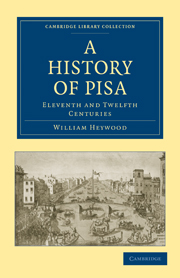Book contents
- Frontmatter
- BIOGRAPHICAL NOTE
- PREFACE
- Contents
- LIST OF PLATES
- I A FLOATING REPUBLIC
- II THE EXPULSION OF MOGAHID FROM SARDINIA
- III THE EXPEDITIONS AGAINST PALERMO AND MEHDIA
- IV THE FIRST CRUSADE
- V THE BALEARIC EXPEDITION
- VI WAR WITH GENOA
- VII THE WAR WITH THE NORMANS
- VIII INTO THE VORTEX
- IX PISAN COLONIES
- X FREDERICK BARBAROSSA
- XI EXPULSION OF THE GENOESE FROM CONSTANTINOPLE
- XII BARISONE OF ARBOREA
- XIII RAINALD OF COLOGNE
- XIV GENOA AND LUCCA AGAINST PISA
- XV CHRISTIAN OF MAYENCE
- XVI THE COMMUNES DEPRIVED OF THEIR CONTADI
- XVII PISA AND THE EMPEROR HENRY VI
- XVIII ‘THE GREAT REFUSAL’
- XIX PISA UNDER THE GOVERNMENT OF THE CONSULS
- XX CONSORTERIE GENTILIZIE
- XXI FROM CONSULS TO POTESTA
- BIBLIOGRAPHICAL APPENDIX
- INDEX
- Plate section
XVI - THE COMMUNES DEPRIVED OF THEIR CONTADI
Published online by Cambridge University Press: 05 July 2011
- Frontmatter
- BIOGRAPHICAL NOTE
- PREFACE
- Contents
- LIST OF PLATES
- I A FLOATING REPUBLIC
- II THE EXPULSION OF MOGAHID FROM SARDINIA
- III THE EXPEDITIONS AGAINST PALERMO AND MEHDIA
- IV THE FIRST CRUSADE
- V THE BALEARIC EXPEDITION
- VI WAR WITH GENOA
- VII THE WAR WITH THE NORMANS
- VIII INTO THE VORTEX
- IX PISAN COLONIES
- X FREDERICK BARBAROSSA
- XI EXPULSION OF THE GENOESE FROM CONSTANTINOPLE
- XII BARISONE OF ARBOREA
- XIII RAINALD OF COLOGNE
- XIV GENOA AND LUCCA AGAINST PISA
- XV CHRISTIAN OF MAYENCE
- XVI THE COMMUNES DEPRIVED OF THEIR CONTADI
- XVII PISA AND THE EMPEROR HENRY VI
- XVIII ‘THE GREAT REFUSAL’
- XIX PISA UNDER THE GOVERNMENT OF THE CONSULS
- XX CONSORTERIE GENTILIZIE
- XXI FROM CONSULS TO POTESTA
- BIBLIOGRAPHICAL APPENDIX
- INDEX
- Plate section
Summary
Unfortunately for the Sienese, they seem to have taken no part in the compromise of Pavia, and the Florentines were thus enabled to press home the advantage that the battle of Asciano had given them. By the treaty of March, 1176, in which not only the Emperor but also Christian of Mayence and Count Macharius were expressly named, the Florentines were acknowledged as the legitimate masters of the whole contado of Fiesole and Florence, and obtained one-half of the possessions of the Sienese in Poggibonsi. Several of the conditions were particularly harsh, and the Commune which was destined soon to become the firm ally of Pisa was terribly crippled. Florence was slowly achieving a position of ascendency in Tuscany, and, ere the century closed, many of her neighbours had learned to regard her with much the same feelings of misgiving as Germany inspired in the other European nations between 1906 and 1914, and as the United States still continues to inspire in the Latin republics of South America. That time, however, was not yet, and the cordial relations which existed between Pisa and Florence were not immediately impaired by the Peace of Pavia. It had not yet occurred to the Pisans that the friendship of Florence was a dangerous thing; and the Florentines, who were anxious to reap the full benefit of the treaty of July, 1171, scrupulously lived up to their part of the contract.
- Type
- Chapter
- Information
- A History of PisaEleventh and Twelfth Centuries, pp. 207 - 215Publisher: Cambridge University PressPrint publication year: 2010First published in: 1921

